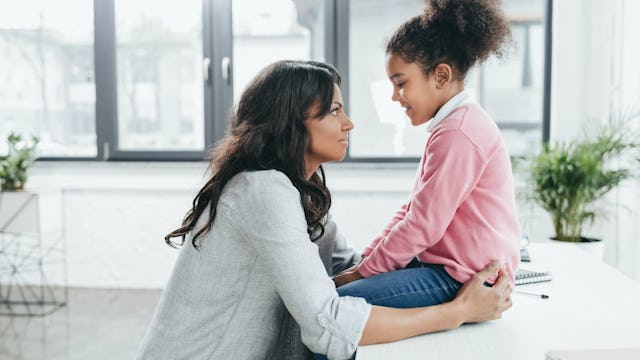Dear Daughter, You Don't Need To Be Polite

As a southern woman, I have found that we are too often taught through our experiences that, above everything else, we should be polite. At some point throughout our life, in often compounding ways, we are shown that under most circumstances, we should always err on the side of politeness. No matter what we want to say, or what we are feeling, the appropriate response is to smile and nod.
Instead of telling the truth, we bless people’s hearts. Instead of saying what we want to say, we hug graciously. My experiences don’t necessarily need to be the same as my daughter’s, which is why I want to raise her to explicitly understand that being polite is not necessarily a requirement in this life.
I was recently at a lunch event with friends and relatives when two women started a conversation with me and then, rather stunningly, said disparaging things about a close family member of mine. Instead of responding the way my inner voice wanted me to, engaging in a verbal street fight, I was polite.
Later that same year my family and I were having lunch at a local restaurant and were seated across from a chatty, elderly couple. I’m certainly accustomed to people interacting with us as a family when we are out with our children, as nothing gets grandpa up and chatting like cute kids. The problem wasn’t anything he said, it was merely his insertion into our family lunch. I was more uncomfortable with his level of comfort, his assumptions that he could barge right into our meal. I didn’t put an end to the conversation or ask for the privacy I wanted. Instead, I was polite.
Having sat there, silent, I hated the way I felt and wanted to share those feelings with my daughter. I wanted her to know that if she was ever in a situation like that, in which someone was making her uncomfortable, she didn’t have to put up with it. I pulled her aside, got eye-to-eye with her, and told her my lie. “I want you to know that it’s always okay for you to not interact in situations like that. If someone makes you feel uncomfortable, it would be totally fine for you to say that you are not interested in engaging with him.”
She stared blankly at me, and asked, “Well, why didn’t you?”
Her question has stuck with me for months. Time after time, I have allowed things to be said or done and instead of standing up for myself, I’ve opted to be polite. I have sacrificed my own feelings for someone else’s comfort. The old man’s feelings shouldn’t have been put ahead of my desire for privacy. Those women didn’t deserve to be protected for being hurtful. My feelings within the space of these events matter, and I want my children to feel the same way.
I want my daughter to find the balance that I didn’t necessarily grow up having. I want her to understand the importance of being respectful and polite, but also understand the importance of being brave and saying what she needs to say — even if it’s scary. I don’t want her to sacrifice her own feelings for the comfort of those around her.
So, is it ever okay to ruin the lunch?
As a mother raising a daughter, I have found that in order to combat this pressure to be polite, it’s my responsibility to teach my daughter explicitly and directly that politeness is not a requirement in this life. My words sometimes will not be enough. I have to show her that I am strong enough to do the things I am telling her to do.
So, to all the women out there struggling with this idea that in order to have a happy life, we must be polite; to my dear daughter and all the girls who are growing up with her, I say an emphatic, Yes! It is completely and totally okay to ruin the lunch. Say what you have to say. Even if your voice shakes and it’s really scary, say the words and express your feelings. Take up space in this world without apology, and remember that being polite is not a requirement.
This article was originally published on